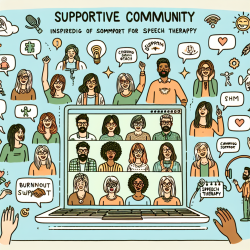Introduction
As practitioners in speech-language pathology, our ultimate goal is to create meaningful and lasting outcomes for children. To achieve this, we must leverage data-driven decisions and adopt innovative approaches. The research article titled "Participatory testing and reporting in an environmental-justice community of Worcester, Massachusetts: a pilot project" provides valuable insights into participatory testing and its potential to empower communities. This blog explores how practitioners can apply these insights to enhance their skills and encourage further research.
Understanding Participatory Testing
The research conducted in Worcester, Massachusetts, focused on participatory testing and reporting (PT&R) in an environmental-justice community. This approach involves community members actively participating in environmental testing and receiving actionable results in a timely manner. The study aimed to empower residents by involving them in the testing process and providing them with information that could lead to informed decision-making.
Key Findings and Implications
The study revealed several key findings that have implications for practitioners:
- Empowerment through Participation: Involving community members in the testing process fosters a sense of ownership and empowerment. Practitioners can apply this principle by engaging children and their families in the assessment and intervention processes, allowing them to take an active role in their own progress.
- Timely and Actionable Reporting: Providing timely and actionable feedback is crucial for empowering individuals. Practitioners should ensure that assessment results are communicated clearly and promptly, enabling families to make informed decisions about their child's development.
- Building Trust and Co-ownership: The study highlighted the importance of building trust and co-ownership between researchers and community members. Practitioners can foster trust by actively involving families in goal-setting and decision-making, creating a collaborative partnership that enhances outcomes.
Encouraging Further Research
The research conducted in Worcester serves as a pilot project, highlighting the potential of participatory testing in environmental-justice communities. However, further research is needed to explore its application in different contexts and populations. Practitioners are encouraged to engage in research that investigates the impact of participatory approaches in speech-language pathology, particularly in underserved communities.
Conclusion
Participatory testing and reporting offer valuable insights for practitioners seeking to improve their skills and create positive outcomes for children. By involving families in the assessment and intervention processes, providing timely and actionable feedback, and building trust and co-ownership, practitioners can empower families and enhance their practice. To read the original research paper, please follow this link: Participatory testing and reporting in an environmental-justice community of Worcester, Massachusetts: a pilot project.










